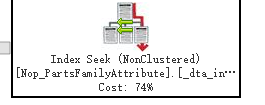Hi @ahmed salah ,
create index :
CREATE [CLUSTERED | NONCLUSTERRED]
INDEX index_name ON table_name (column_name)
When creating a table, the primary key column will create a clustered index by default, and a table can only have one clustered index, so please check whether the table has a clustered index.If there is already, then you can only create a non-clustered index, it can have more than one.
Here is an example of how to improve query efficiency with indexes created by myself, which contains methods for creating various indexes (including creating indexes on two columns), you can refer to:
drop table dbo.Users
drop table dbo.Sessions
CREATE TABLE dbo.Users
(
username VARCHAR(14) NOT NULL,
);
CREATE TABLE dbo.Sessions
(
id INT NOT NULL IDENTITY primary key,
username VARCHAR(14) NOT NULL,
starttime DATETIME2(3) NOT NULL,
endtime DATETIME2(3) NOT NULL,
pty INT NOT NULL,
CONSTRAINT CHK_endtime_gt_starttime
CHECK (endtime > starttime),
CONSTRAINT CHK_priority_range
CHECK (pty BETWEEN 1 AND 31)
);
-- Sample data (small)
--TRUNCATE TABLE dbo.Sessions;
--TRUNCATE TABLE dbo.Users;
INSERT INTO dbo.Users(username) VALUES('User1'), ('User2'), ('User3');
INSERT INTO dbo.Sessions(username, starttime, endtime, pty) VALUES
('User1', '20160101 08:00:00.000', '20160101 08:30:00.000', 1),
('User1', '20160101 08:05:00.000', '20160101 08:35:00.000', 2),
('User1', '20160101 08:00:00.000', '20160101 08:30:00.000', 3),
('User2', '20160101 08:00:00.000', '20160101 10:30:00.000', 3),
('User2', '20160101 08:30:00.000', '20160101 10:00:00.000', 2),
('User2', '20160101 09:00:00.000', '20160101 09:30:00.000', 1),
('User2', '20160101 11:00:00.000', '20160101 12:00:00.000', 3),
('User2', '20160101 11:30:00.000', '20160101 12:30:00.000', 2),
('User2', '20160101 11:40:00.000', '20160101 12:40:00.000', 3),
('User2', '20160101 12:00:00.000', '20160101 13:00:00.000', 2),
('User3', '20160101 08:00:00.000', '20160101 09:00:00.000', 1),
('User3', '20160101 08:00:00.000', '20160101 08:30:00.000', 2),
('User3', '20160101 08:30:00.000', '20160101 09:00:00.000', 3),
('User3', '20160101 09:30:00.000', '20160101 09:31:00.000', 1);
IF OBJECT_ID(N'dbo.GetNums', N'IF') IS NOT NULL DROP FUNCTION dbo.GetNums;
GO
CREATE FUNCTION dbo.GetNums(@low AS BIGINT, @high AS BIGINT) RETURNS TABLE
AS
RETURN
WITH
L0 AS (SELECT c FROM (SELECT 1 UNION ALL SELECT 1) AS D(c)),
L1 AS (SELECT 1 AS c FROM L0 AS A CROSS JOIN L0 AS B),
L2 AS (SELECT 1 AS c FROM L1 AS A CROSS JOIN L1 AS B),
L3 AS (SELECT 1 AS c FROM L2 AS A CROSS JOIN L2 AS B),
L4 AS (SELECT 1 AS c FROM L3 AS A CROSS JOIN L3 AS B),
L5 AS (SELECT 1 AS c FROM L4 AS A CROSS JOIN L4 AS B),
Nums AS (SELECT ROW_NUMBER() OVER(ORDER BY (SELECT NULL)) AS rownum
FROM L5)
SELECT TOP(@high - @low + 1) @low + rownum - 1 AS n
FROM Nums
ORDER BY rownum;
GO
DECLARE
@num_users AS INT = 2000,
@intervals_per_user AS INT = 500,
@start_period AS DATETIME2(3) = '20160101',
@end_period AS DATETIME2(3) = '20160107',
@max_duration_in_ms AS INT = 3600000; -- 60 nimutes
--TRUNCATE TABLE dbo.Sessions;
--TRUNCATE TABLE dbo.Users;
INSERT INTO dbo.Users(username)
SELECT 'User' + RIGHT('000000000' + CAST(U.n AS VARCHAR(10)), 10) AS username
FROM dbo.GetNums(1, @num_users) AS U;
WITH C AS
(
SELECT 'User' + RIGHT('000000000' + CAST(U.n AS VARCHAR(10)), 10) AS username,
DATEADD(ms, ABS(CHECKSUM(NEWID())) % 86400000,
DATEADD(day, ABS(CHECKSUM(NEWID())) % DATEDIFF(day, @start_period, @end_period), @start_period)) AS starttime,
ABS(CHECKSUM(NEWID())) % 3 + 1 AS pty
FROM dbo.GetNums(1, @num_users) AS U
CROSS JOIN dbo.GetNums(1, @intervals_per_user) AS I
)
INSERT INTO dbo.Sessions WITH (TABLOCK) (username, starttime, endtime, pty)
SELECT username, starttime,
DATEADD(ms, ABS(CHECKSUM(NEWID())) % @max_duration_in_ms + 1, starttime)
AS endtime,
pty
FROM C;
select * from dbo.Sessions
select count(*) from dbo.Sessions
--eg:select username,pty from dbo.Sessions where username='User0000000515'
--no index
DBCC dropcleanbuffers --Empty the cache
set statistics io on --Open IO statistics
select username,pty from dbo.Sessions where username='User0000000515'
--nonclustered index
create nonclustered index index1 on dbo.Sessions(username)
DBCC dropcleanbuffers --Empty the cache
set statistics io on --Open IO statistics
select username,pty from dbo.Sessions where username='User0000000515'
--create a compound index
DROP index index1 on dbo.Sessions
create nonclustered index index2 on dbo.Sessions(username,pty)
DBCC dropcleanbuffers --Empty the cache
set statistics io on --Open IO statistics
select username,pty from dbo.Sessions where username='User0000000515'
--covering index
DROP index index2 on dbo.Sessions
create nonclustered index index3 on dbo.Sessions(username) include(pty)
DBCC dropcleanbuffers --Empty the cache
set statistics io on --Open IO statistics
select username,pty from dbo.Sessions where username='User0000000515'
DROP index index1 on dbo.Sessions
DROP index index2 on dbo.Sessions
DROP index index3 on dbo.Sessions
The test table has 1 million pieces of data, so it will be slow when the table is built (it takes two or three minutes).
Best Regards
Echo


